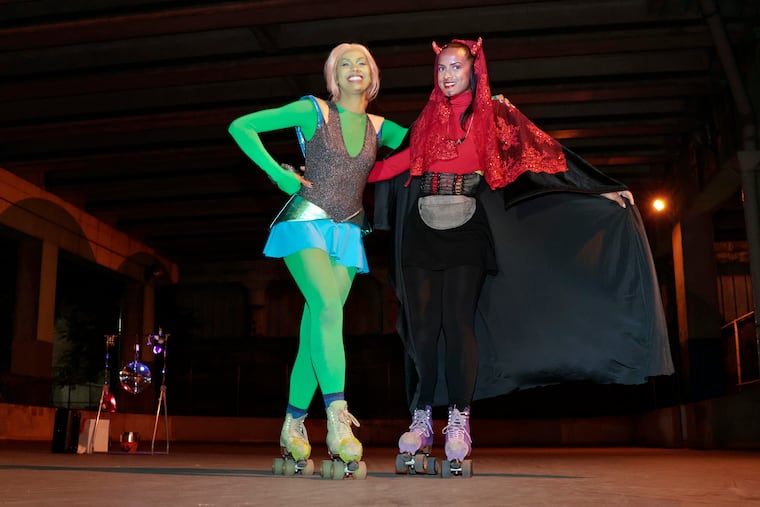There are few places to jam skate around town — so these sisters created one in South Philly
“The roller skate scene in Philadelphia is about making your own space,” said Cullan Bonilla, a frequent attendee.

Aija Suuta just wanted to listen to Beyoncé's new album with a group of people.
Suuta, who identifies as queer and uses she/they pronouns, heard influences on the Renaissance album that moved her, from disco to some queer genres — and felt as if she had to move to the music with others who, like her, felt seen by the music. So they thought to themself, why not create an event where they could do just that?
In August, Suuta and their sister Tatiana organized their first jam skate event in South Philadelphia, with the theme Renaissance. The sister duo have now hosted three such themed events at Front Street’s Rizzo Rink — which Philly skaters have renamed to Front Street Rink to disassociate from former Mayor Frank Rizzo — creating a space for jam skating that’s hard to come by in Philly’s city limits, and a space that serves BIPOC and queer folks.
“It’s just been a communal space, especially for youth, to have something to do recreationally — and music is a really big part of it,” said Suuta. “It’s a way for people to come together.”
Inspired by other skating groups in Philly such as Skateadelphia and Rolling With the Homos, the Suuta sisters emphasized that they wanted to add another option to Philadelphia’s skating scene that is focused on jam skating (Philly has many more spaces for park skating, they said), that is outdoors for COVID-19 safety purposes (most jam skating options are roller rinks located in the suburbs of Philadelphia), and that is centered on marginalized communities.
“The roller skate scene in Philadelphia is about making your own space,” said Cullan Bonilla, a frequent attendee of the Suutas’ skate nights. “The city doesn’t really have that many places that you can skate. We’re just scouting out an area that’s freshly paved, that doesn’t see a lot of car traffic.”
And the few spaces that are designated as skate parks, Bonilla said, are rarely suitable for jam skating, and are typically very male-dominated — making it hard for others to feel comfortable in that space.
"It’s very freeing in a way, like creating the gay utopia you want to see in the world."
A cornerstone of the Suutas’ skate nights is fostering environments that are inclusive of BIPOC and queer people, particularly because skating culture has deep roots in Black culture and history.
“A lot of rinks do have anti-Black policies, which is unfortunate — regulating the wheels used, the dress codes and the music that was played that forced out a lot of the Black culture from the rinks where it originated,” Tatiana Suuta said. “We want to make sure that it’s a safe space for people of all walks of life and color and dance styles to come together and gather.”
When segregation was outlawed in the United States, many white people stopped going to roller rinks that Black people frequented. So roller rink owners started hosting themed skate nights that some say were coded language for the Black community, such as soul night, R&B night, and, the one that ultimately stuck long-term, “Adult Night.” Still, Adult Nights have often been subject to high security, and many rinks’ rules and regulations clearly target aspects of Black skating culture, sending an unwelcoming message.
“There are legitimate safety concerns,” a Black rink manager said in the 2018 documentary United Skates. “But if you go to a rink and they go, ‘There’s no trios, you can’t skate locking arms, you can’t skate backwards, you’re skating too fast.’ Whatever they could come up with, and then they’re not saying that to other people — that’s when the bells go off, OK what’s really going on?”
The Suutas’ skate nights are a breath of fresh air in that sense — they explicitly center marginalized people in the events they create, making space for everyone to show up as their authentic selves and feel safe doing so.
“The skate community is like everything else, you’re never going to come across a magical community of people that’s not replicating the same power structures that exist outside that community,” said Bonilla.
“It made a really big difference for me, as a queer, nonbinary person, showing up with my girlfriend and being able to feel safe there, seeing other people who are visibly queer and trans just enjoying themselves. It’s very freeing in a way, like creating the gay utopia you want to see in the world,” Bonilla said.